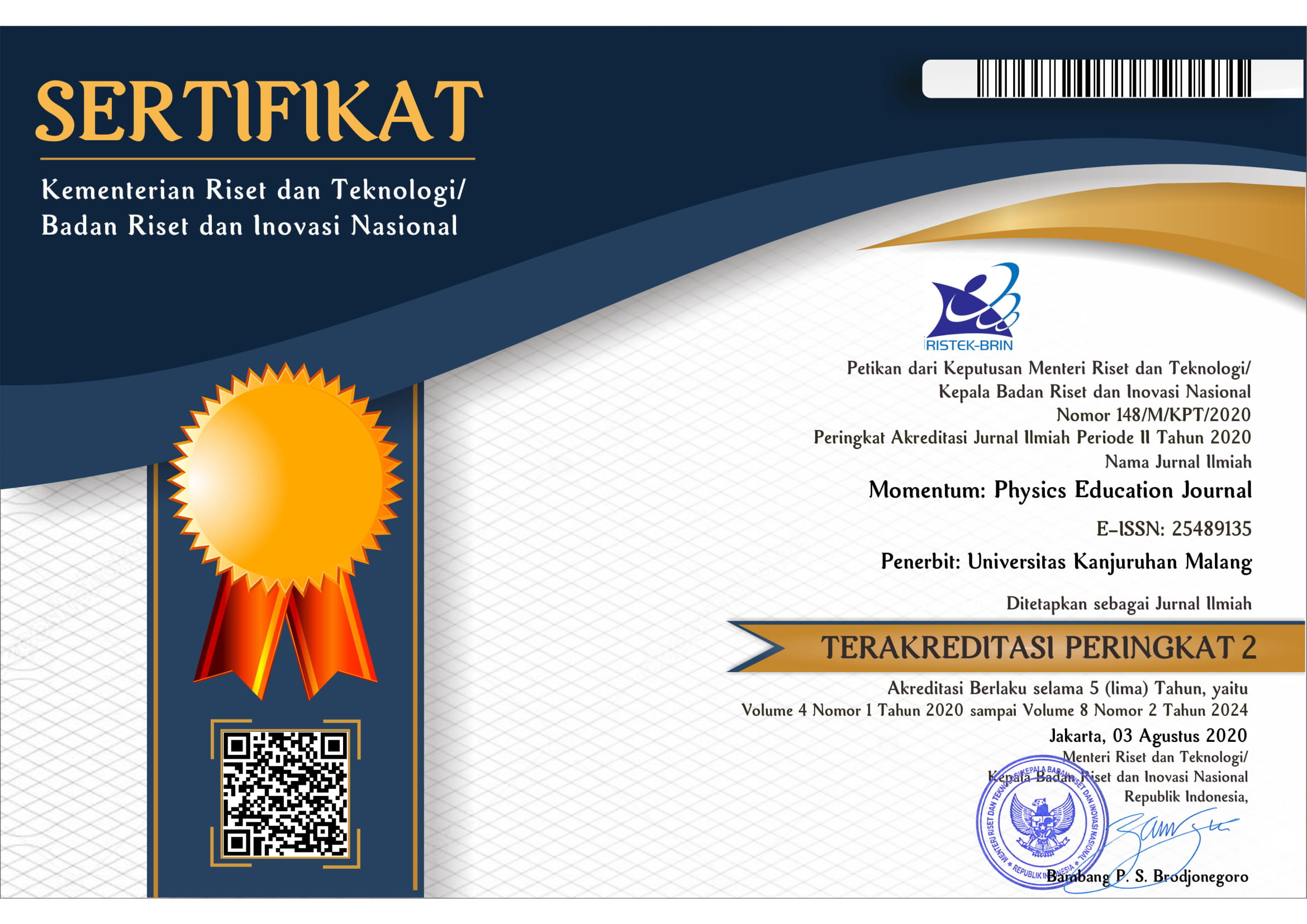Problem-solving learning influence on physics learning outcomes based on logical thinking ability
DOI:
https://doi.org/10.21067/mpej.v3i1.3174Keywords:
problem solving, logical thinking, learning achievementAbstract
Problem solving learning is designed to develop students’ ability in solving scientific problem. The purpose of this study is to test the effectiveness of problem solving model on students’ learning outcomes and logical thinking ability. It employed a quasi-experiment with a 2x2 factorial design. The subject was Tenth graders of SMKN 6 Malang. Randomly, it determined two classes of control class and two classes of experimental class. The instrument of this research was logical thiniing test instrument and Physics learning outcome instrument. In addition, it used lesson plan on static fluid as an instrument. Normality and homogenity testing were employed before testing the formulated hypothesis. It employed Liliefors for normality testing and Bartlett for homogenity testing. To test the hypothesis, this research employed Two-ways of ANAVA and Scheffe testing. The results show that (1) Physics learning outcomes of students who learnt by means of problem-solving learning strategy is higher than students who learnt by means of conventional one. (2) It affirms the interaction between problem-solving learning strategy and logical thinking ability of students on Physics learning outcomes. (3) Physics learning outcomes of students who learnt by means of problem-solving learning strategy with high logical thinking ability is higher than students who learnt by means of conventional one. (4) Physics learning outcomes of students who learnt by means of problem-solving learning strategy with low logical thinking ability is higher than students who learnt by means of conventional one.
Downloads
References
Aida, N. (2010). Pendekatan Pembentukan Konsep dengan Metode Refutational Text Pada Materi Suhu dan Kalor Untuk Meningkatkan Penguasaan Konsep dan Kemampuan Berpikir Logis Siswa. Tesis tidak diterbitkan. Bandung: PPs UPI
Arends, R. I. (2008). Learning To Teach Belajar untuk Mengajar. Yogyakarta: Pustaka Pelajar.
Cohen, L., Manion, L. & Morrison, K. (2007). Research Methods in Education (Sixth Edition). New York: Taylor & Francis e-Library.
Darniwa, A.V. (2011). Hubungan Kemampuan Berpikir Logis dengan Pemahaman Konsep Melalui Pembelajaran Problem Solving Pada Konsep Ekosistem. Skripsi tidak diterbitkan. Bandung: PPs UPI
Fah, L.Y. (2009). “Logical Thinking Abilities Among Form 4 Students in The Interior Division of Sabah, Malaysiaâ€Â. Journal of Science and Mathematics Education in Southeast Asia. 32(2), 161-187
Hafizah, E., Misbah, M., & Annur, S. (2018). Kemampuan pemecahan masalah mahasiswa pada materi mekanika. Momentum: Physics Education Journal, 2(2). https://doi.org/10.21067/mpej.v2i2.2729
Januarifin, D., Parno, P., & Hidayat, A. (2018). Kesalahan siswa SMA dalam memecahkan masalah pada materi Hukum Newton. Momentum: Physics Education Journal, 2(2). https://doi.org/10.21067/mpej.v1i1.2292
Lawson, A. E. (1995). Science Teaching and the Development of Thinking. California: Wadsworth Publishing Company.
Prayogo, K. (2011). Model Pembelajaran Creative Problem Solving (CPS) Untuk Meningkatkan Penguasaan Konsep Fluida Statis Dan Kemampuan Pemecahan Masalah Siswa. Tesis tidak diterbitkan. Bandung: PPs UPI
Roadrangka, V., Yeany, R.H., & Padilla, M.J. (1983). The construction and validation of Group Assessment of Logical Thinking (GALT). Paper presented at the Annual Meeting of the National Association for Research in Science Teaching, Dallas, TX.
Roadrangka, V. (1995). Formal operational reasoning ability, cognitive style and achievement in Biology, Physics, and Chemistry concepts of Form 4 students in Penang, Malaysia. SEAMEO Regional Centre for Education in Science and Mathematics, Penang.
Santyasa, I.W. (2007). “Model Model Pembelajaran Inofatifâ€Â. Makalah. Disajikan dalam pelatihan tentang Penelitian Tindakan Kelas bagi Guru-Guru SMP dan SMA di Nusa Penida, tanggal 29 Juni s.d 1 Juli 2007.
Saragih, S. (2011). Penerapan Pendekatan Pembelajaran Matematika Realistik dan Kelompok Kecil Untuk Meningkatkan Kemampuan Keruangan, Berpikir Logis dan Sikap Positip Terhadap Matematikasiswa Kelas VIII. Desertasi tidak diterbitkan. Bandung: PPs UPI.
Semedi, P. (2010). Keefektifan Model Pembelajaran Problem Solving Terhadap Hasil Belajar Peserta Didik Kelas VII Semester II SMP Negeri 8 Batang Pada Materi Pokok Segiempat Tahun Pelajaran 2009/2010. Tesis tidak diterbitkan. Semarang: Universitas Negeri Semarang.
Sumardyono. (2007). Pengertian Dasar Problem Solving. (Online), http://p4tkmatematika.org/file/problemsolving, diakses 15 April 2012).
Suryaman, U. (2010). Efektivitas Model Pembelajaran Problem Solving Untuk Meningkatkan Hasil Belajar Siswa Pada Mata Pelajaran Matematika. Tesis tidak diterbitkan. Bandung: PPs UPI
Downloads
Published
How to Cite
Issue
Section
License
Copyright (c) 2019 Momentum: Physics Education Journal

This work is licensed under a Creative Commons Attribution-ShareAlike 4.0 International License.


.png)
.png)
.png)
.png)




